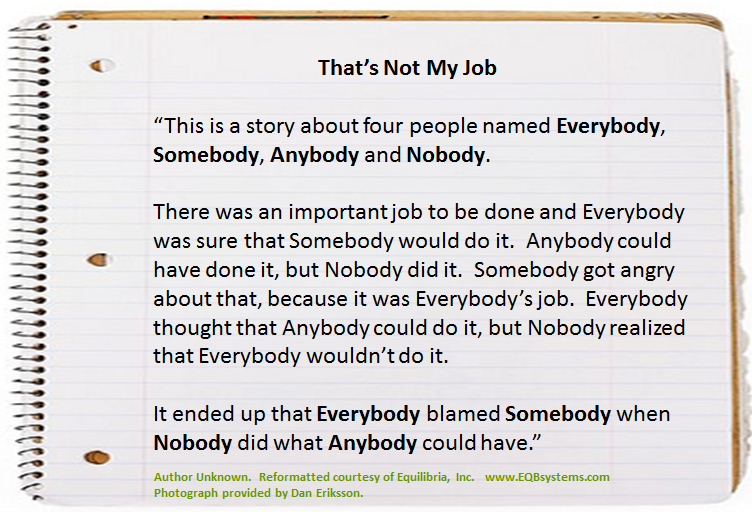In his infamous business book, “How to Win Friends and Influence People,” Dale Carnegie instructs salespeople and entrepreneurs alike to “Remember that a person’s name is to that person the sweetest and most important sound in any language.”
The same holds true for a person’s job title or more appropriately, role (although titles are just as important as defining roles). A person’s title/role can literally set, whether intentionally or not, certain boundaries and expectations in terms of work distribution, salaries, level of respect, interpersonal communication and perceived influence.
Don’t think for a second that titles/roles do not matter in small businesses!
I recall many years ago working alongside a team of operators at a chemical plant. Fatigued, we spent several days trying to figure out why a certain piece of equipment failed causing low production. One morning the Unit Supervisor, frustrated by our lack of teamwork, stormed into the control room and sternly distributed the following poem that has resonated with me to this very day…

We immediately got the message from the poem! As a team running the unit, we allowed superficial beliefs and stereotypes about each of our titles/roles to get in the way of working together to solve a nearly catastrophic problem.
Although this poem is humorous, it sheds light on an otherwise serious issue – lack of accountability in the workplace. Yes, boundaries and business infrastructure should definitely be in place to prevent total chaos and to ensure efficient work and information flow, but there is a fine line between rigidity and flexibility. Too much structure in the form of rigidly defined roles can cause work flow inertia or paralysis.
The key is in adaptability. When jobs (and their respective titles/roles) are well-defined and documented, then processes can be written that others can follow if a team member is either unavailable or unable to perform his/her job. Work should not stop simply because a person who could function as a temporary replacement feels the responsibility is either above or beneath him/her.
In the manufacturing process world, we refer to temporary replacements as “changeover”. However, it also applies to business processes as well where people, rather than machines, are the driving forces for continuous work and information flow. Quick Changeover allows for maximum productivity and efficiency as it eliminates potential downtime (which saves your company money) while preserving a healthy respect for the role of each team member.
3 Reasons Why Job Titles/Roles Matter and How to Use it Your Advantage
1. Reduces Ambiguity Through Clear, Task-Oriented Job Descriptions.
Each time you go through the painstaking process of defining a new position at your company, you will also have to assign a title to that role or position. Do your due diligence in assigning titles. Use discretion as you determine whether to add the words, “coordinator,” “manager,” or “supervisor” to a title. These terms typically apply to the more senior level positions within a company. If this type of title is incorrectly given, it can set the expectation that a relatively inexperienced employee has many years of experience and will be treated as such by your other staff. When the “secret” about the inexperienced employees credentials is discovered, you can best believe it will lead to poor work relations. Take the time to craft well-documented job descriptions that show the diversity, core responsibilities and expectations of each staff position. You can clearly articulate the needs and expectations of each role, including those of positions you’ve identified as being outsourced. Once all job titles are properly defined, you should expect an increase in employee ownership and accountability coupled with a decrease in turnover.
2. Maximizes Performance Through Strategic Workload Distribution.
With so many moving parts in today’s high-growth small businesses, developing an efficient design that doesn’t slow down progress is critical. It is important to assign the proper titles/roles in a bottom up organizational design. Top heavy companies (those with multiple layers of management) tend to get weighed down causing critical tasks to fall through the cracks oftentimes because an improperly “entitled” person felt the work was beneath him/her. One of the best ways to build employee morale and accountability is through cross-training and creating an infrastructure that allows employees to work their way up to the top. Cross-training promotes synchronization across all departments and activities but it is still important to ultimately hire people to do what they are best at based on educational and work experience.
3. Facilitates a Lean Company Culture.
Once you redesign your business to promote cross-training, quick changeover and reduced layers of management, job titles become less important as the emphasis shifts towards each employee’s ability to produce desired results. This means less waste, less errors and less bureaucracy – all necessary ingredients for facilitating a lean company culture. Include your company’s revised organizational chart as part of the onboarding process for each new hire, even for interns and outsourced consultants and contractors. Everyone who does work for your small business should know the following prior to accepting a position:
- the description, title and tasks/duties of the position
- the authority (if any) that accompanies the job
- the direct manager in charge or the chain of command
- the members of the position’s proposed team
- the expectations for cross-training
- the processes to follow and how work performance is measured
These are just three main reasons why job titles matter in small businesses. Of course there are more. Feel free to share those reasons in the comments below.
*****************
This post is dedicated in loving memory to Clarence Francis, Jr. – my former mentor who first gave me the “That’s Not My Job!” poem.











